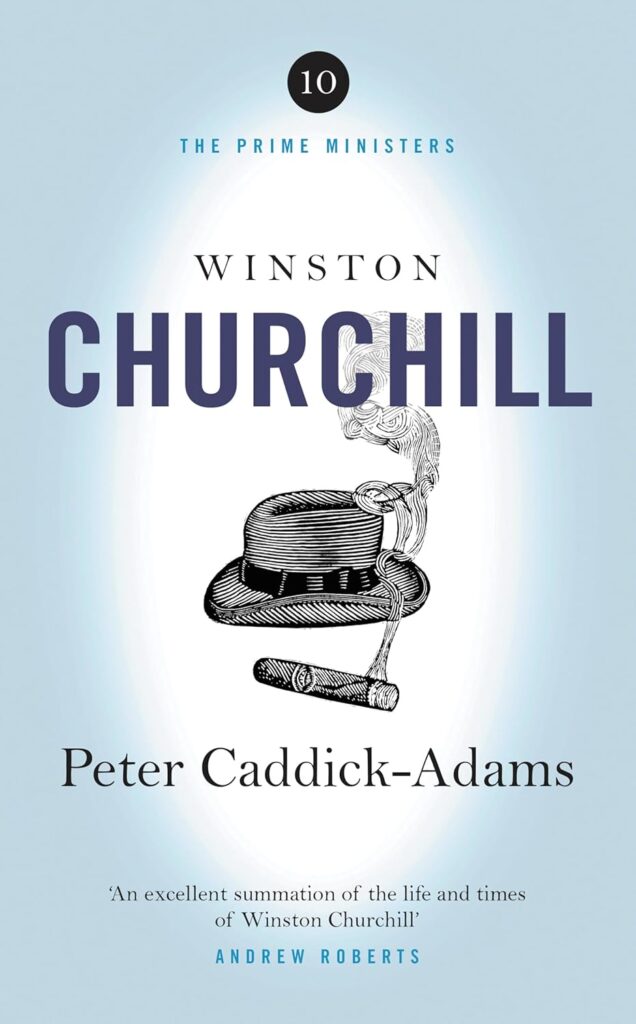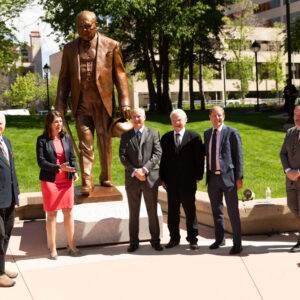
Bulletin #194 — Jul 2024
Excellent Summation

To view in full, right click and select "View in New Tab"
July 7, 2024
Peter Caddick-Adams, Winston Churchill, Swift Press, 2024, 176 pages, $19.49 / £16.99. ISBN 978–1800753556
Review by OLIVER RHODES
Writing about Churchill, Peter Caddick-Adams admits, is “as mammoth an undertaking as the two world wars with which he was intimately involved.”
Neither is it as enjoyable as it once was. In Britain especially, Churchill’s life and legacy has come under intense scrutiny. His statue in Parliament Square sometimes needs police protection.
In his new life, which comes to just 200 pages, Caddick-Adams seeks a return to basics. His focus is Churchill’s war-time premiership and those aspects of his earlier life which “explain how he acquired the personal tools to deliver a wartime premiership so effectively.” The result is a sharply rendered, if rather laudatory, appraisal of Churchill the war-leader.

2025 International Churchill Conference
As First Lord of the Admiralty in Herbert Asquith’s government, Churchill led the world’s most powerful navy into the Great War. The experience fed Churchill’s appetite for command and control and taught him how to bend the imperial personalities at the Admiralty to his will.
His strategic mistakes would also prove valuable, in time. The disastrous Dardanelles campaign of 1915, which he orchestrated, resulted in more than 200,000 British and Commonwealth casualties. But it informed the successful amphibious assault on Normandy in July 1944, prepared with better intelligence and support for the landing troops.
This is a grand life told at scale, but not the place for a thorough appraisal of Churchill’s politics. Churchill scholarship, Caddick-Adams observes, must now balance between “excessive hagiography” on one side and “a growing school of iconoclasm” on the other. In the end, the author strikes a tone which is more hagiographical than he would perhaps like, but it serves an important purpose. Caddick-Adams debunks popular myths, such as that Churchill deliberately starved Indians during the Bengal Famine of 1943 (it is generally accepted that the constraints of the war were more important than Churchill’s supposed antipathy to India).
Riveting military and strategic details are the compensation. One chapter opens with a history of the Maginot Line, the “Hobbit-like network” of forts set up in northern France and Belgium after the Great War. The French, we are told, “blew” most of their defense budget on the project but left a weak spot in the Ardennes Forest; war-games suggested it would take Germany at least 10 days to attack here. “In the event the Germans, who did attack precisely in this area, managed it in three, and in complete secrecy.”
Such passages put Churchill’s maverick attitude to war in its proper context. His political heart may have been nineteenth century, but his strategic mind was firmly settled in the twentieth. Churchill’s career was one exerted in finding new ways to conduct war.
This spirit probably denied Churchill the Nobel Peace Prize in 1953. The destruction of allied fleets to prevent enemy capture, the creation of hit-squads to execute top officials, and the fire-bombing of entire cities, were never off the cards. All, of course, featured in Churchill’s Second World War: in the destruction of the French fleet at Oran in 1940 (“the most hateful decision, the most unnatural and painful in which I have ever been concerned,” Churchill later wrote), the creation of the Special Air Service in 1941, and the obliteration of Dresden in 1945. He had to settle instead on the Literature prize, given for his services to oratory.
Where new studies of Churchill seek to alter the traditional narrative, then, Caddick-Adams falls in line. The fundamentals of Churchill’s extraordinary life stand out true and clear, and his example of leadership is revived for a new generation.
As Churchill admitted many times through his career, he loved war and begged to be at its centre. But the old lessons of Churchill’s leadership, so often repeated, demand repetition. “The maintenance of peace,” he noted in 1938, “depends upon the accumulation of deterrents against the aggressor.” He could have been speaking of modern Ukraine, but he was speaking about Czechoslovakia after Chamberlain’s shambolic Munich Agreement with Hitler.
The main criticism of Caddick-Adams’ short, sharp plunge into Churchill’s life is that he walks too closely in the great man’s footsteps. Perhaps this is his background as a British Army regular exposing itself. “Going to war can be a liberating experience,” Caddick-Adams opines, “as the individual frees themselves from personal and professional woes and ties up their affairs in the event of death.”
This and other asides remind us that, recent iconoclasm aside, Britain’s greatest Prime Minister still exerts a substantial influence on his legacy.
Oliver Rhodes was a Henry Fellow at Harvard University from 2022 to 2023. He previously studied an MPhil and BA in History at the University of Cambridge.
Subscribe
WANT MORE?
Get the Churchill Bulletin delivered to your inbox once a month.





